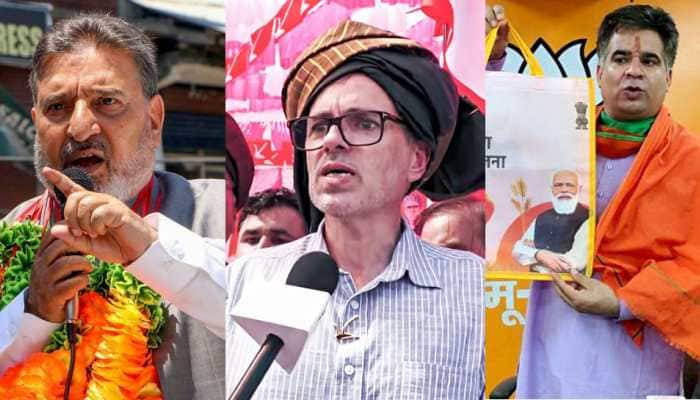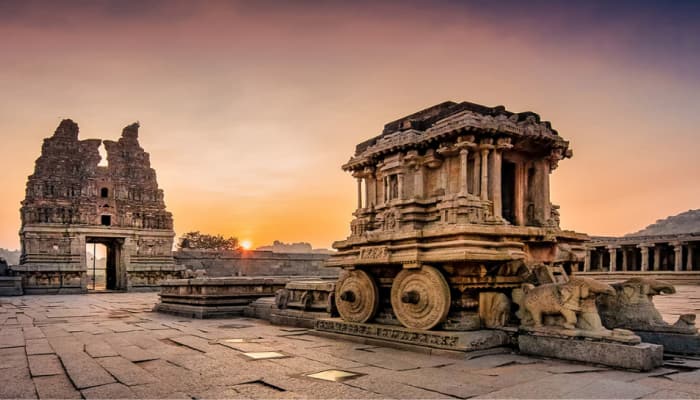My Country, My Life: A commentary of self-vindication
“After sometime, another dome fell. The third dome met with the same fate soon thereafter. Someone came and started distributing sweets. I said, ‘No, I will not have sweets today’.”
Trending Photos
)
Shivangi Singh
“After sometime, another dome fell. The third dome met with the same fate soon thereafter. Someone came and started distributing sweets. I said, ‘No, I will not have sweets today’.” – L K Advani on Ram Janmabhoomi-Babri Masjid in his autobiography My Country, My Life
L K Advani sounds different, acts different and appears so surprisingly moderate from what we know of him. Who is the real Advani? Is he the hardliner, the divisive mobiliser or the diplomatic author of this memoir – solidifying ground for his dream, and probably the last chance, of being the Prime Minister of India.
Advani’s recently unveiled autobiography appears more to be an account of self-vindication, an attempt to break-free from his controversial political image. It seems more like a carefully drafted speech, written for a special purpose and occasion, instead of being a candid and frank account of his life. He just touches and leaves sensitive issues like Babri Masjid and Gujarat riots and there seems an inhibition in his approach.
The aggressive Advani, for the first time, appears to be on the defensive.
Published by Rupa and Co and released by the former President APJ Abdul Kalam, the thick political memoir covers almost eight decades of Indian politics, as seen through the eyes of the veteran BJP leader. Neatly divided in five phases of his life, the book touches major and minor events in his life. Advani talks about joining RSS at the age of 15, the unbearable trauma of Partition and his meeting with Atal Bihari Vajpayee. He gives a vivid account of the early days of the Jana Sangh and the turbulence it caused during the Emergency.
Advani goes on to relate his experiences in the NDA government as the Home Minister and Deputy Prime Minister, his endeavour during Agra Summit, the traumatic days of Kargil War, and his take on the various controversies that surrounded him. The events recounted in the book are familiar, sentences are short, words are crisp almost reflecting the disciplined life that the writer has lead. But the memoir fails to answer many questions. And indeed creates more of them. What is being said has already been in public domain for long.
The book does not satisfy the mammoth curiosity which readers have about L K Advani – India’s longest-serving politician. He writes in detail about work and activities he undertook for the various organisations – Rashtriya Swayamsevak Sangh, Bharatiya Jana Sangh and then Bharatiya Janata Party. But he says precious little about his personal life, his family and about his youthful years. There is no insight into the thought process which contributed his long and arduous political journey.
Adavni’s take on persons and issues
On Ayodhya
Advani’s claim in an interview that a mosque cannot be built on the disputed Ram Janmabhoomi-Babri Masjid site, when he has expressed regret on the demolition of Babri Masjid is extremely beguiling. In an exclusive interview to Zee News, he says movements like Ayodhya are ongoing. But what he fails to commit to is its final solution.
In the book he says that he felt ‘sad’ over the demolition of the mosque. Why did a sad Advani stand the fall of a mosque at the hands of kar-sevaks is a question that he doesn’t touch. It is evident that he makes no attempt to hide his satisfaction over the large Hindu support (including from the police personnel in Uttar Pradesh) to the Ayodhya movement that incited communal chaos all over the country.
He says, “I am recounting this incident only to highlight the general mood of the populace, including employees and officials of the state government, after the tragic development in Ayodhya – was that of jubilation.”
Inspite of his attempts to sound like a secularist, he comes out as a political opportunist attempting to gain wider popularity.
On UPA government
Advani is accused of coming very hard on Prime Minister Manmohan Singh, Congress and the Left parties in the book. He says, “However, my main grievance against Singh after he became Prime Minister is that he has allowed devaluation of his high office by surrendering to the authority of the Congress President….It is only during Singh’s tenure that distinction has shifted to 10 Janpath.”
He is critical of the UPA government but refuses to open up to the follies of NDA regime. Advani audaciously justifies his tough response to the terror threat but he forgets that the NDA government failed miserably during IC-814 hijack in December 1999. The government bent, according to the wishes of hijackers, and let-off three hardcore terrorists from Indian jails. Subverting to the terrorist’s will in such a manner- Defence Minister Jaswant Singh ‘escorted’ the terrorists’- is only one of its kind in world history. The terrorists then conducted high-profile attacks and fanned terror activities in India, one of them was involved in the kidnapping and killing of Daniel Pearl.
On Sonia Gandhi
Although Advani personally visited Sonia Gandhi and presented her with a copy, she remains the target of his attack in the book. Behold the argumentative Indian – “Why did Sonia Gandhi not take Indian citizenship for fifteen long years after coming to India, and even after giving birth to her two children here? Till date, she has not answered this question satisfactorily.”
In his public speeches he never misses an opportunity to talk about the ‘all-inclusiveness’ of Indian culture. But the fact that the exponents of this culture are unwilling to accept a daughter-in-law of foreign origin cannot be missed.
He talks about the Bofors scam “If there is one thing that has disappointed me the most, it is her active and irrefutable collusion in covering up the role of fellow Italian, Ottavio Quattrocchi, in the infamous Bofors scandal.” Ironically, NDA’s regime was marred by scandals like the infamous coffin-gate scam (Kargil Martyr coffins were bought at 13 times higher then the actual price), Killer MIG’s, misuse of Kargil cases, irregularities into purchases for Operation Vijay (Kargil Intrusion). Advani doesn’t say much on this.
On Atal Bihari Vajpayee
The relationship between Vajpayee and Advani has been an area of great speculation. Much has been said about his differences with Vajpayee, but his memoir emphasises that things have always been fine between them. He says “I always implicitly and unquestionably accepted Atalji to be my senior and my leader. I would put forth my views but once I sensed what Atalji wanted, I would invariably go along with his viewpoint or preference.”
The other point which needs to be taken into consideration is the difference between Advani’s projected image and reality. During the course of his long, and inarguably eventful, political life, “Advani has at times been misunderstood and as a result become a victim of the dichotomy between image and reality," Atal Bihari Vajpayee says in the foreword of the book.
Advani says that the party deliberately cultivated his image as a hardliner while Vajpayee was projected as secular. But the question arises that wasn’t it ‘dishonest’ on part of Advani to go along with party politics while his heart had other renderings – as he would have us believe. Wasn’t it unethical to allow to be projected wrongly?
On Gujarat riots and Narendra Modi
In the memoir, he expresses distress about Gujarat riots, and talks of his attempts to salvage the situation. He says “I immediately rang up Chief Minister Modi and asked him to take necessary steps to provide protection to the needy. Modi called me back the next day to say that no untoward incident took place and potential miscreants were arrested.”
But the episodes recounted are just a handful. What about thousands who suffered agony, pain and faced death during the Godhra riots? Advani tries to escape from taking up the blame, he shrugs off stating that he tried to rectify the situation.
Narendra Modi has been referred to in glowing terms. Instead of demanding Modi’s resignation due to Godhra riots, Advani happily justifies support to Modi stating that all party members, except Atal Bihari Vajpayee, supported his wish that Narendra Modi should not resign.
He talks about the recent landslide win of Narendra Modi in elections. He states, “I consider the outcome of the Gujarat polls significant for another reason. It showed how a leader with integrity, courage and competence could count on people’s support to beat back a personalised campaign of vilification.”
On Jinnah
Advani’s description of Jinnah was a brave but a calculated move to project a moderate image. He termed Jinnah as a "secular" leader in Pakistan, which created huge controversy back in India.
“When I first came to know, while I was still in Karachi, about the storm generated by my visit to Jinnah’s mausoleum and my remarks about him, I asked my staff to send the complete text of Jinnah’s speech in the Constituent Assembly of Pakistan, which projected the vision of a secular state, to my party colleagues in Delhi,” he says.
His remarks gave momentum to demands for his resignation, yet he clung on to power by withdrawing his resignation. It was only when he was pointedly told, did he pass the baton to Rajnath Singh in the Mumbai session. And it is clear that he did so with a heavy heart.
Controversies surrounding the memoir
One doesn’t expect someone of Advani’s stature to commit mistakes, leave aside factual errors. But the book is being criticised for editorial and factual errors. The book states that Robert Blackwill was the US ambassador to India at the time of the IC-814 hijack and that Bhagat Singh was hanged for throwing a bomb in the Delhi assembly. (He was sentenced in Lahore conspiracy case).
Furthermore, he says that he was not aware of the decision to send then Foreign Minister Jaswant Singh with the three Jaish-e-Mohammad terrorists to Kandahar (in the then Taliban-ruled Afghanistan) during the IC-814 hijack in December 1999. The terrorists were exchanged to free the 160 Indian hostages. But BJP leaders, including George Fernandes refute, this claim stating that he was aware of the situation. In a recent rally in Rajasthan, Sonia Gandhi took a dig at him by questioning whether he was not trusted by the then Prime Minister Vajpayee on the issue to not have informed him.
Another major flaw in the writing is digression, for example, while talking about how impressed he was with Swami Ranganathananda’s discourses at the Ramakrishna Mission, he meanders and starts describing who Ranganathananda was and the great work undertaken by Ramakrishna Mission by jumping several decades in time.
It gets embarrassingly worse. CPI leader Satya Pal Dang leader from Punjab was pronounced dead with ‘late’ prefixed before his name. When the leader- quite alive- condemned this ‘error’, Advani reportedly rung him up and apologised.
Evidentally, Advani in this political autobiography attempts to re-invent himself as a moderate statesman. He projects himself as a ‘kinder, gentler and moderate’ politician above petty politics, yet never convincingly taking ownership for his mistakes. The autobiography may hit popularity due to the huge persona of Advani but disappointment would creep in after finding out that so many crucial questions remain unanswered.
Stay informed on all the latest news, real-time breaking news updates, and follow all the important headlines in india news and world News on Zee News.
Advertisement
Live Tv
Advertisement







)
)
)
)
)
)
)
)
)
)
